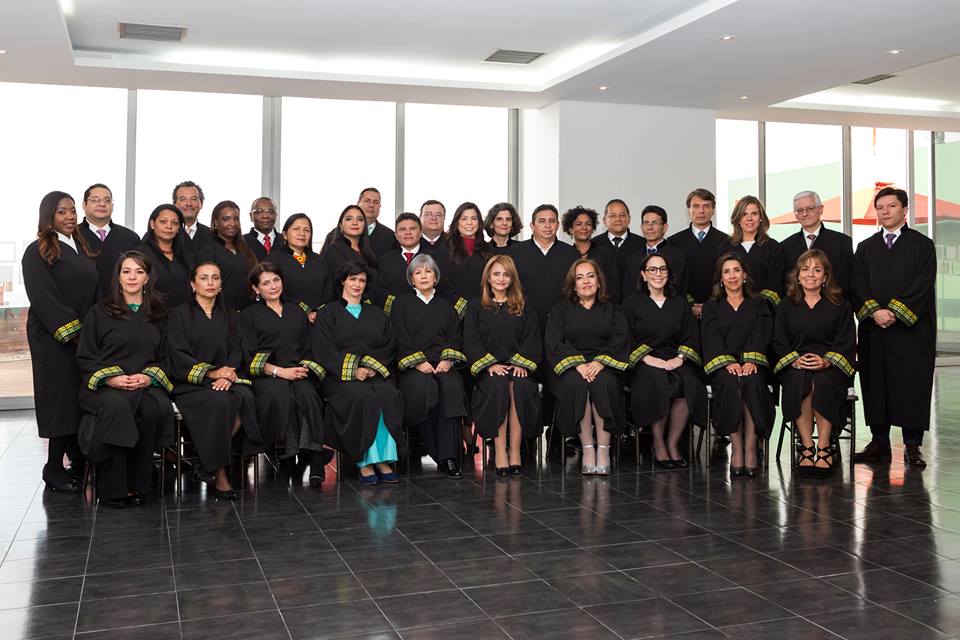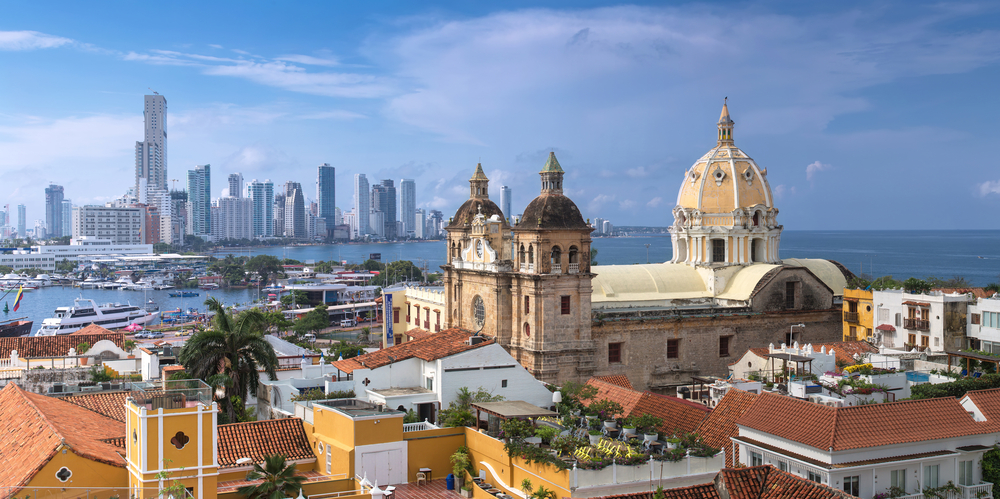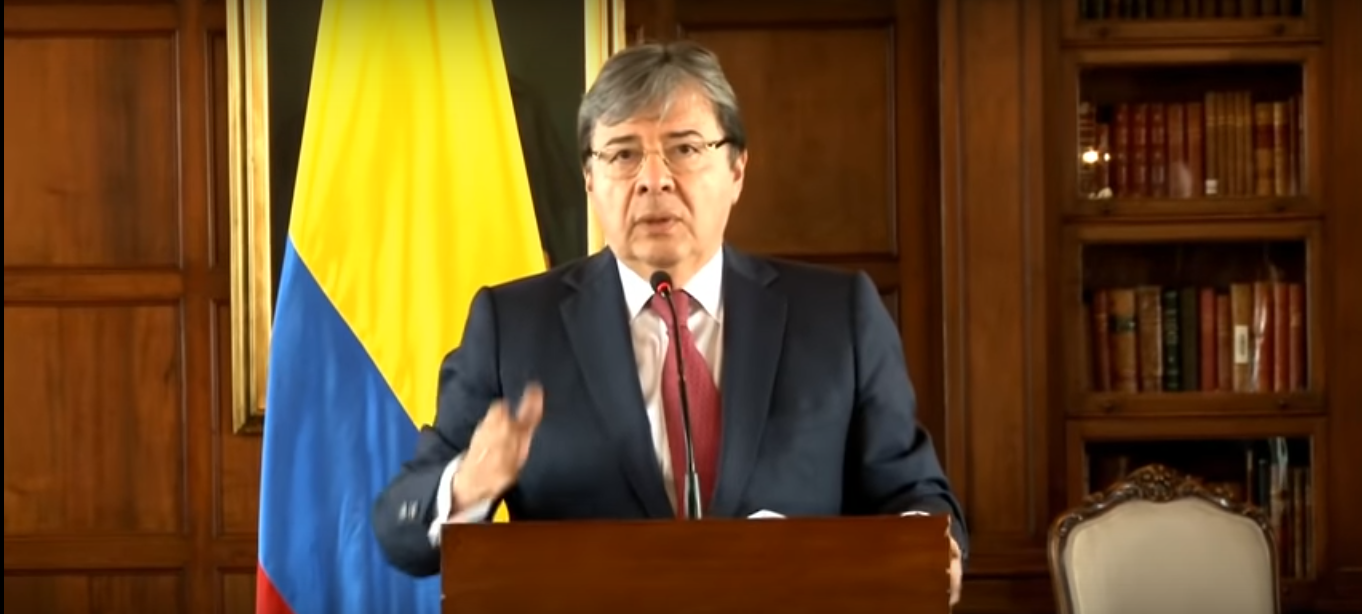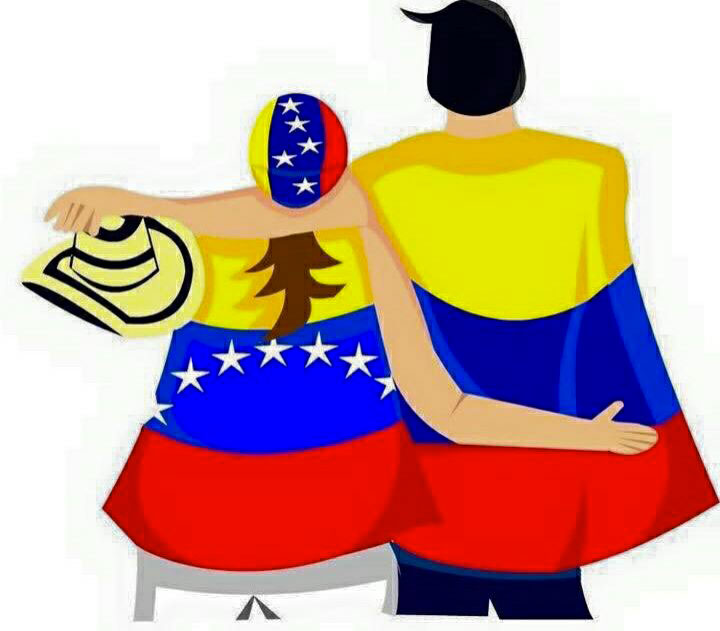 As hundreds of thousands of Venezuelans in Colombia try to build new lives, Frank Silva Cardona speaks to some of them about the challenges of starting over.
As hundreds of thousands of Venezuelans in Colombia try to build new lives, Frank Silva Cardona speaks to some of them about the challenges of starting over.
‘Cousin, I have to leave Venezuela for good.” I hadn’t seen my cousin for 14 years and we were discussing our planned holiday reunion, but now his vacation looked like it would be permanent.
I asked him why. “My business partner and I were extorted. A local gang threatened to kill us if we didn’t pay them. I can’t live like this anymore.”
He had been running a graphic design business in the city of Maracay, an hour west of Caracas. That week his business partner picked up the phone to a man who said he represented El Tren de Aragua – a local gang known for extortion, robbery and kidnappings – and demanded money for “protection.”
The man knew where he lived, where he and his wife worked, what car he drove, and that his first son had been born that year. After the food shortages and armed robberies, this was the final straw.
So we changed our plans: I would visit Colombia and help my cousin and his partner start a new life in Bogotá. I am originally from Venezuela, but my mum took my brother and me to Canada in 2002 after an attempted coup against President Hugo Chavez.
Sadly, their story is all too common. Bogotá and the rest of the country are an obvious destination for Venezuelan migrants because of similarities in language and culture, and a relatively short distance from home. Decades ago, thousands of Colombians emigrated to Venezuela to escape economic insecurity and violence, now many of those same Colombians have returned, followed by thousands of Venezuelan immigrants searching for safety and opportunity in Colombia.
We spoke about the xenophobic posts on social media from people calling Venezuelans Venecos – a racist term – and accusing them of being lazy people who steal Colombian jobs for wages below the minimum.
Venezuela’s violence and kidnappings are well reported around the world, but I was shocked when a woman we’ll call Carolina* told me she left Venezuela a few weeks ago after an incident one morning:
“My daughter and I were on our way to her daycare at sunrise when we saw two men approaching down the street. When they separated and walked towards us from opposite pavements, I knew I was in trouble. They suddenly ran at us and I jumped on my daughter to protect her. They started beating and kicking me, but I didn’t let go of my daughter. They tried to take her from me. When a neighbour heard me screaming for help, he chased the men away. I left my daughter at daycare and went to work.”
She, like many in similar situations, somehow made it over the border without a passport for either her or her child.
It is difficult to get an accurate picture of how many people we’re talking about. An El Tiempo report last year estimated that 2,800,000 Venezuelans had arrived in the country since 2003, though of course many would have only been visiting.
There are certainly over 77,000 members of a Facebook group called Venezolanos en Bogotá. I asked if any were willing to share their stories and María agreed to meet me for coffee.
She told me when she was back home in Maracay, she would ignore traffic lights as she raced the sunset home. “I was that afraid if I stopped at a red light, motorizados would pull up alongside the car and kidnap us.”
María says she came here because she has Colombian nationality and family. She explained that her husband had refused to leave their home for years, in spite of the struggles – even after he had been kidnapped, robbed of his car and left on the side of a road. “We left suddenly one night when my husband heard from a fellow military member that officials wanted to question and potentially imprison him. In panic we packed up our valuables and drove to the border that night.”
“When we made it across the border I was shocked how everything we lacked in Venezuela – rice, corn flour, milk for our kid, and other basic goods – were so easily available. My daughter wanted to try all the different types of cereal in the stores.”
Once in Bogotá, Venezuelans must find work and a home to rent – which is incredibly difficult without a work visa or citizenship. Even people like María, who arrive legally and with the right to work, find it difficult to land professional jobs, despite being experienced back home. “Companies in Bogotá don’t want to call my references in Venezuela, so I haven’t been able to find a job in my field,” María told me. “My husband found a job as a yoga instructor and I’m helping my landlord manage her rentals until I can find a job.”
Venezuelans who arrive without work visas must work under the table, often for below the minimum legal monthly wage of COP$737,717. A close friend is paid COP$25,000 a day as a street vendor for ten hours of work.
There are many stories of Venezuelans being taken advantage of after arriving in the city. Some ask the Facebook group for legal help after being fired a few days after starting a job, without receiving any pay. But sadly Venezuelans who aren’t legally able to work cannot make claims for lost wages or they’ll risk deportation.
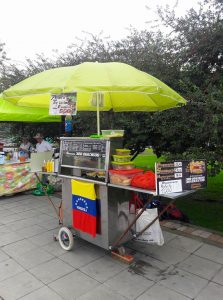
For some Venezuelans arriving in the city, street vending jobs are some of the only options. Photo: Venezolanos en Bogotá
But it’s not all bad. There are also some local non-profit organisations who help new arrivals make adjustments to life in the city. One group called La Familia de Venezolanos en Bogotá hosts picnics, networking events and cultural trips to give Venezuelans in Colombia opportunities to build relationships, business partnerships and to learn the history and culture of their new city as they transition to new lives. Eduardo Navarro, founder of the group, told me how their events help Venezuelans integrate: “All of the experiences we provide have the end point of allowing people to live the fundamental experiences human beings need when they find themselves outside of their country. This strategy allows us to understand, help and support all Venezuelans who contact us.”
A Colombian coffee shop employee in Chapinero told me he sees Venezuelans every day on the TransMilenio and SITP buses performing songs or begging for money. He told me he feels bad for the struggles of Venezuelans. We discussed the xenophobic posts on social media from people calling Venezuelans Venecos – a racist term – and accusing them of being lazy people who steal Colombian jobs for wages below the minimum.
Despite these struggles most Venezuelans I meet are happy about being in Bogotá. They are amazed at walking the streets at night without worrying about motorizados and gunshots. “At least if I’m robbed here they won’t put a bullet in my head for my cellphone,” my cousin told me after walking home from work one night.
Throughout my time in Bogotá I felt awkward meeting Venezuelans who lived through our country’s recent struggles while I lived an easy life in Canada. Nevertheless we connected through our common stories of seeking a better life abroad. Despite finding ourselves far away from home, we hope one day to return to our country when living conditions and safety improve. María’s sentiment is our common vision for the future: “I’m doing this for my kid; my husband and I hope to return to Venezuela when we can live a normal life again.”
* Names have been changed to protect identities.
By Frank Silva Cardona

